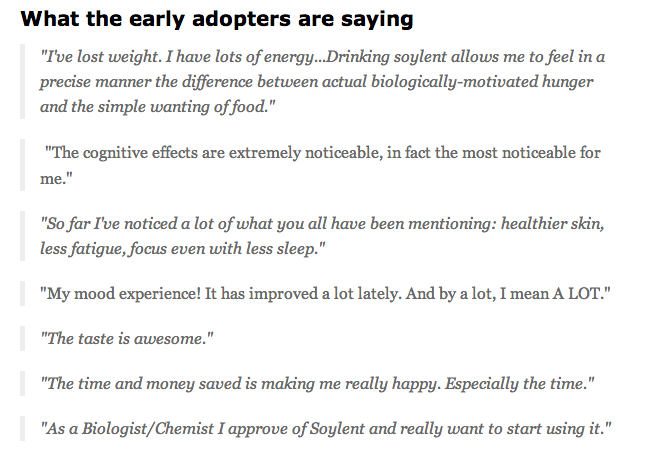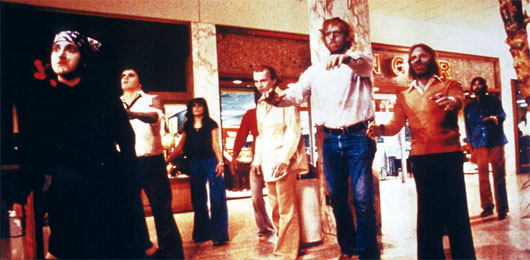
Have you read about this? A 24-year old man got tired of having to make meals and, unbelievably, eat. (Who the hell hates to eat?) Instead of learning to cook some nice meals for himself and learn to enjoy the experience of eating like the rest of the human race, he decided to spend his time coming up with a goopey meal replacement. After a few months of experimentation with said meal replacement, he felt pretty good health-wise. Based on that, he figured it was time to hit the Big Time and turn this into a commercial endeavor.
From Soylent Corporation:
What if you never had to worry about food again?
For many people, on many occasions, food is a hassle, especially when trying to eat well. Suppose we had a default meal that was the nutritional equivalent of water: cheap, healthy, convenient and ubiquitous. Soylent will be personalized for different body types and customizable based on individual goals. It allows one to enjoy the health benefits of a well balanced diet with less effort and cost.
There are so many things wrong with this.
First of all, none of the people on the team are nutritionists or have a background in medicine. In fact, the guy who started the whole thing has a background in electrical engineering and computer science. He started this whole experiment just a few months ago. He is not an expert in nutrition. I also don’t see any references on their page about consultation with any experts. Does this not scare anyone?
Secondly, the original copy on the page included the following (it has since been removed):
Soylent is perfectly balanced and optimized for your body and lifestyle, meaning it automatically puts you at an optimal weight, makes you feel full, and improves your focus and cognition.
Extraordinary claims, no? How exactly is it “perfectly balanced and optimized” for anyone’s body and lifestyle? What’s in it exactly? As far as I know, it’s only been tested on one guy for a few months. How do they know it will “automatically” put me at an optimal weight and make me feel full? And how the hell will it improve my focus and cognition?

Perhaps the Soylent boys should team up with Kevin Trudeau?
The testimonials found in the section entitled “What the early adopters are saying” are laughable. Who are these people? Wouldn’t it have been better to include medical trials and scientific data showing that this works? I’m sorry, but subjective testimonials don’t cut it when it comes to things that will be ingested.
Finally, take a look at “The Team”. It consists of four young guys, two who are in charge of marketing and sales. Shouldn’t they have more people dedicated to testing these theories out?
Someone on Hacker News put it best:
This is pure hubris! This idea has been pursued for decades by people who have dedicated themselves to scientific rigour.
I’ll say it again. The founders of Soylent have Engineer’s Disease. They think because they’re engineers they’re experts in food science. That’s delusional.
As far as I know, a sample size of ONE GUY is not enough to conclude that something works. If the original experimenter wanted to do things right, he should’ve consulted with experts, done a ton of science, tested it out a bunch of times, gotten his ideas peer-reviewed, and THEN gone to market with it. But no, it’s 2013, why not just come up with an idea, write a blog about your “experimentation”, and then immediately take it to market with some crowdsourcing scheme.
There’s just something wrong about a bunch of tech people thinking that because they’re good at software development and they’re smart, they can take those skills and apply them to any other field.
Let’s be honest. Software development is trivial to get into. You just need a laptop and the internet. That’s it. You can download all the tools you need. Most of it is free. If there’s knowledge you need, just go online and Google it. Go to StackerOverflow.com and get answers to any questions you have there. Want to write an iPhone app? Tons of examples online. Want to write a cloud-based service? No problem. That does NOT translate to other fields, like medicine or nutrition.
I hope this fails. Miserably.




